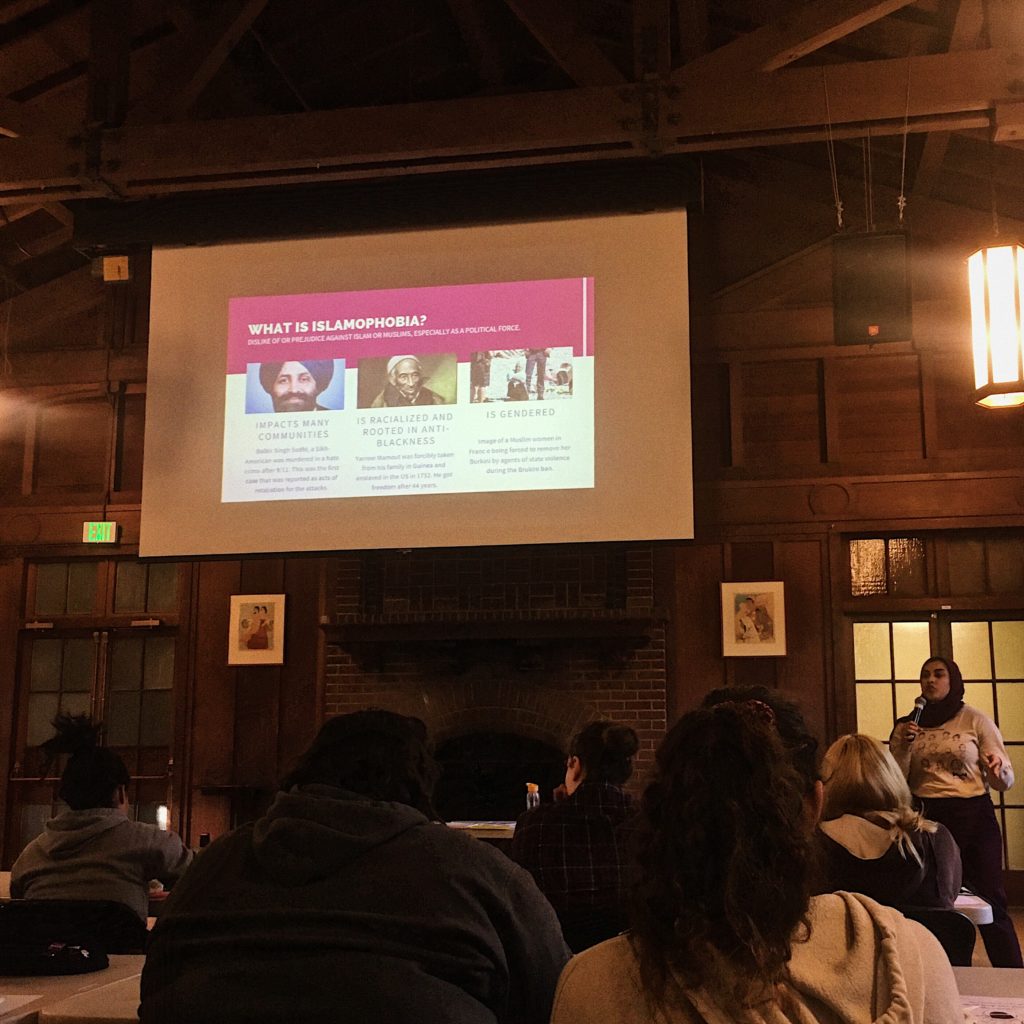On April 16, the Muslim Student Alliance (MSA) held a workshop on the Islamophobia industry, which is the financial system that benefits from creating fear based misinformation on Islam.
The event was from 6:00 p.m to 7:00 p.m in the Student Union in honor of Southeast Asian Middle Eastern Asian Pacific Islander (SAMEAPI) Heritage Month. It was supported in part by Ethnic Studies and the SAMEAPI planning committee, which is comprised of members from MSA, the Asian Pacific Islander Student Alliance (APISA) and other SAMEAPI identified students, faculty and staff on-campus.

The interactive workshop was led by Haleema Bharoocha, a Gender Justice Activist & Malikah Bay Area Director. Malikah is a grassroots self-defense organization for women that has evolved to encompass solidarity in sisterhood through healing, financial literacy, entrepreneurship and organizing.
Co-President of the Muslim Student Alliance Nadia Bourdoud shared that Co-President Samia Abbasi proposed Bharoocha as a speaker for SAMEAPI month planning. They decided upon the Islamophobia Industry workshop from other workshops such as bystander intervention, allyship in the age of Islamophobia and technology policy to name a few offered by Bharoocha.
Bharoocha provided a content warning, which is used to alert the audience that material might illicit a strong negative emotional response, for the material that would be covered during the course of the workshop. She encouraged people to take care of their needs as they arose. Bharoocha grounded the workshop by holding a moment of silence for the lives lost in the Mali and New Zealand terrorist attacks to bring them in to the space.
The agenda for the workshop began by defining basic terms and concepts in relation to Islam, and using that shared understanding to build the framework to address the roots of Islamophobia, and the industry that profits more than $200 billion in promoting Islamophobia for political gain.
“I am a practicing Muslim but I never knew how much money was going into the [Islamophobic] industry, and if that doesn’t tell you something, I don’t know what does — that fact as a practicing Muslim that I didn’t know means that others might not have known as well,” Bourdoud said.
The Islamophobic Industry happens through the philanthropic system, a small core of investors, scholars and advocates. The top funders listed were: Steven Emerson, Daniel Horowitz, Robert Spencer, David Yerushalmi, Daniel Pipes, Frank Gaffney, Paul Singer, Seth Klarman and former funder Richard Mellon Scaife.
Those funders support networks of nonprofit organizations. These nonprofits rely on bias experts that generate misinformation about Islam, and that information is shared through larger media and political networks.
“Islamophobia is not a natural occurrence in American or Western culture but is something that is institutionally funded and promoted but seeing people act in strength and unity by showing up [to the workshop] and participating in discussion was really energizing for me,” Mills student Imani Dawson said upon reflecting on the workshop.
Bharoocha shared the work of Dr. Maha Hilal, an inaugural Michael Ratner fellow with the Institute for Policy Studies in Washington, D.C. and among her many roles is a committee member of the Justice for Muslims organization. Hilal is an outspoken advocate for human rights, and works to dismantle the systems of Islamophobia through community engagement, coalition building and political organizing.
“A Muslim identity is not a monolith identity, there is a large Muslim population and it has great diversity within it, and should be respected no matter what — whether or not that diversity fits within a respectability politic or not,” Mills Student Rwan Turner said when sharing thoughts on the workshop.
Bharoocha concluded by providing actionable steps in order to expand the impact of the anti-Islamophobic work, such as sharing what was learned with friends and family to raise consciousness around the issue of Islamophobia and to consider it’s global impact.
In addition, she encouraged participants to donate to Muslim organizations, support Muslim owned businesses and share news stories that impact the Muslim community, especially since they tend to be under reported. At one point, she posed the question asking what a world without Islamophobia would look like.
“Thinking about what a world where Islamophobia doesn’t exist looks like has stuck with me because that question is so big — it’s kind of weird for me because I’m so use to preparing myself to be cautious in public, it’s become routine, and that question disrupts that,” Bourdoud said.
MSA is for Muslim students, allies and those interested in Islam to gather and share community with one another. MSA also organizes educational and cultural events, such as the Islamophobia Industry workshop and collaborates with campus partners to arrange special meal services for students fasting during Ramadan.
